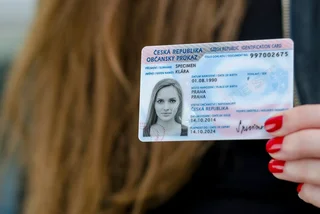Czech authorities have started issuing a new type of citizen’s identity card (občanský průkaz) with biometric data stored on a highly secure contactless chip. This will make the possibility of counterfeiting and abusing the ID more difficult.
The new identity cards, issued as of Aug. 2, will contain a representation of the card holder's face and two fingerprints, according to the Czech Ministry of Interior.
PARTNER ARTICLE
“Identity cards will now be more secure and we will still be able to travel around Europe with them, without having to carry a passport,” Interior Minister Jan Hamáček said.
The obligation to introduce biometric data in the ID card is based on a European regulation. The aim is to increase security and simplify the exercise of the right of free movement of EU citizens and their family members.
The obligation to introduce biometric data in the identity card is based on a European regulation. The introduction of stricter security standards, which protect documents against possible forgery and fraudulent misuse of identity, is aimed at increasing security and simplifying the exercise of the right of free movement of EU citizens and their family members.
If biometric data were not introduced into ID cards, these cards would be usable only in the Czech Republic and it would not be possible to travel abroad on newly issued documents. The regulation also provides for a gradual change. Already-issued ID cards will still be usable until the end of their validity, no later than Aug. 3, 2031. This applies to both pink and blue (polycarbonate credit card-sized cards) and green ID cards. ID cards that do not contain a machine-readable zone must be exchanged within five years, otherwise it will not be possible to travel with them.

ID cards can be exchanged for new ones before they expire, but the owner must pay a CZK 200 fee. Also new, people will be able to keep their expired ID cards. In the past people had to turn them over.
ID cards that do not have a specified expiration date and which were issued only to citizens born before Jan. 1, 1936, must be exchanged by Aug. 3, 2026. Very few of these are in existence.
The proposal to change the cards was approved by the Chamber of Deputies, the lower house of Czech Parliament, on June 2, 2021, in the third reading, and was later approved by the Senate and signed into law by President Miloš Zeman law on July 8. "The approval of a new type of citizen’s ID card is good news for everyone,” Hamáček said when the lower house approved the bill.
Biometric data will be kept in the information system of registration of identity cards for a maximum period of 90 days from the production of the document, for the purposes of settling any complaints. They will then be deleted because it is not allowed to create any databases that would collect biometric data, the Ministry of Interior states.
At the same time, it will not be possible to use the biometric data stored in the identity card for purposes other than verifying the authenticity of the identity card and the identity of the holder of the identity card when crossing state borders. Children under the age of 12 will not be required to provide fingerprints.
Every citizen of the Czech Republic over the age of 15, who has a permanent residence and is not restricted in his or her autonomy, must have a citizen’s ID card. On average, 1.4 million citizens are issued annually. The standard period of their validity is 10 years.
There are several other changes. Most notably, from next year, all women will be allowed to have their last name entered on the card without the mandatory ending -ová. Until now, for example, only women of other nationalities or who were living abroad were allowed to do so. It will, however, still be mandatory to list gender on the card.
The ID card also will no longer list academic degrees. The personal identification number (rodné číslo) will not be not be entered in the cards after 2023. The number of the card could serve as an identification number, because, unlike the birth number, no further information can be gathered from it.












 Reading time: 3 minutes
Reading time: 3 minutes 


























